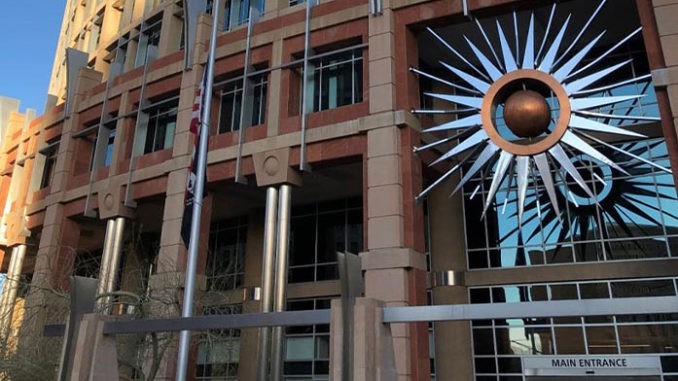
by Staff Reporter | Mar 13, 2025 | Education, News
By Staff Reporter |
A new dashboard tracks the school closures taking place throughout Arizona.
The dashboard comes from the Common Sense Institute (CSI), a nonpartisan organization which primarily produces research on Arizona’s economy.
Since January, those schools which have closed or consolidated operated in the Maricopa, Navajo, and Yavapai counties within the following school districts: Cave Creek, Phoenix Elementary, Mesa Unified, Isaac, Edkey Inc. – Sequoia Village, and American Heritage Academy. Schools closed or consolidated included Lone Mountain Elementary School, Desert Sun Academy, Dunbar School, Heard School, George Washington Academy, and American Heritage Academy Camp Verde.
Data for the dashboard came from the Auditor General and Arizona Department of Education.
CSI also published a line graph chart detailing spending, inflation, enrollment and student proficiencies in math and reading from 2010 to 2024. This data came from the Arizona State Library, Arizona Department of Education, and Joint Legislative Budget Committee.
CSI director of policy and research, Glenn Farley, said the dashboard data indicates a pattern of declining public school enrollment rather than indefinite growth. Per this dashboard, school enrollment peaked over a decade ago.
“Arizona’s public school system was built on the assumption that enrollment would continue to grow indefinitely, but the reality has changed,” said Farley. “With district enrollment peaking over a decade ago and alternative schooling options gaining traction, closures are a natural consequence of a system adjusting to new realities.”
CSI’s dashboard reflects a severe disparity between public school spending, enrollment, and student proficiencies in math and reading. While spending increased by 80 percent since 2010, math and reading proficiencies dropped by 13 and nine percent, respectively, and enrollment dropped by one percent.
Spending far outpaced inflation, growing at over twice the rate: while spending increased by 80 percent, though inflation increased by only 36 percent.
CSI also found that the school-aged population departed from the total population trend around 2020 due to demographic changes. Combined enrollment in public kindergarten programs declined 13 percent since the 2010-11 school year, while total public school enrollment grew three percent.
The state’s school choice program, the Empowerment Scholarship Account program, grew to over 87,200 students as of Monday.
CSI clarified that demographic decline wasn’t the sole reason for changes in the school-aged population. CSI reported that charter school enrollment nearly doubled from 2020 to 2022, 55 percent of surveyed private schools experienced enrollment growth in the 2021 to 2022 school year, and homeschooling grew from two to 11 percent of the population during the pandemic (though that number dropped to around six percent in recent years).
An accompanying CSI report declared the disparities in funding, enrollment, and outcomes were signs of disconnect with the current state of enrollment and capacity.
“Charter, private, and home schools have continued growing, but Arizona’s district public school enrollment peaked over a decade ago,” read the CSI report. “A massive injection of new funding and resources over the past few years has led to significant new spending and expansion by these schools, though, which are now having to deal with the consequences of this disconnect between enrollment and capacity.”
AZ Free News is your #1 source for Arizona news and politics. You can send us news tips using this link.

by Matthew Holloway | Mar 12, 2025 | News
By Matthew Holloway |
The City of Phoenix has drawn the attention of the Goldwater Institute, earning a stern response from the conservative think tank to “Stop violating taxpayers’ rights.” The rebuke comes over a proposed tax increase on businesses that provide services that are precluded by the Arizona Constitution. A final city council vote on this proposal is set for March 18, 2025.
If the hike on Transaction Privilege (“TPT”) and Use Tax rates is approved, the rates go into effect July 1, 2025.
According to Goldwater, “The city of Phoenix has proposed a tax increase on businesses that provide services, claiming it needs the money because of a revenue shortfall. But the burden of the new tax increase will ultimately fall hardest on Phoenix businesses and consumers, raising the prices of services like construction contracting and lodging.” As Goldwater observes, the Arizona Constitution (Art. IX § 25) outright forbids “any county, city, town, municipal corporation, or other political subdivision of the state, or any district created by law” from creating any new or increasing any existing transaction-based taxes on the “privilege to engage in, or the gross receipts of sales or gross income derived from, any service performed in this state.”
Notably though, the prohibition on Section 25 “does not repeal or nullify any tax, fee, stamp requirement, or other assessment in effect on December 31, 2017,” and therefore allowed the pre-2017 taxes already in place. However, as Goldwater Attorney Stacy Skankey explains, the new rates would constitute a new tax under the law.
Skankey wrote succinctly, “New or increased taxation on services violates the Arizona Constitution.”
“The Arizona Constitution has a broad understanding of the term ‘service,’ and it includes a range of covered enterprises on anything that does not produce ‘goods.'”
“Service generally includes activities involving human effort like labor, skill, or advice. The term also covers businesses in the hospitality industry such as hotels, restaurants, and bars. Many of the business classifications subject to the proposed TPT tax increase are services as that term is used in the Constitution.
“The proposal by the Phoenix City Council is a tax increase on services, and therefore, is unconstitutional. Consequently, we urge the City to disapprove of the proposed TPT tax increase and any future proposed tax that may violate the Arizona Constitution.”
As reported by AZ Free News in January, the Goldwater Institute has already launched a lawsuit against the Town of Gilbert after municipal leaders unleashed a similar service tax on Town businesses including homebuilding and short-term rental properties.
Matthew Holloway is a senior reporter for AZ Free News. Follow him on X for his latest stories, or email tips to Matthew@azfreenews.com.

by Matthew Holloway | Mar 12, 2025 | News
By Matthew Holloway |
Arizona Congressmen Andy Biggs (R-AZ5) and Eli Crane (R-AZ2) shared a somewhat cramped carpool video with fellow Freedom Caucus members Reps. Josh Brecheen (R-OK2) and Clay Higgins (R-LA3) last week. The group was commuting from a meeting with President Donald Trump where they discussed the implementation of the president’s policy set out in his address to a Joint Session of Congress the previous night.
The congressmen made light of the close quarters but emphasized their commitment to forwarding the president’s agenda. Higgins quippedsarcastically, “This is the luxury that your congressmen ride in,” as the congressmen laughed. “As you can see we’re in a massive limousine, you know, even though we’re being fed grilled shrimp from the front. Also there’s three of us squeezed into a two-person seat!”
Biggs told followers, “We’re coming back from the White House where we had the privilege of meeting with President Trump. It’s always a great meeting. And we just wanted to let you know that we’re on the cheap, but we are working hard for you.”
Rep. Brecheen commented on Trump’s address saying, “Great speech last night. My gosh.”
Biggs added “We’re gonna do this. We’re going to get President Trump’s mandate through, and that’s not just President Trump’s mandate. That’s the people’s mandate.”
As reported by Fox News, members of the Freedom Caucus, led by Chairman Andy Harris (R-MD), met with Trump and Harris told the outlet, “It’s a meeting with the House Freedom Caucus leadership, and then a few of the people who philosophically share our feelings about the fiscal situation. And we’re going to hear what the president has to say.”
“I’m hopeful we can get this off the ground,” Harris said. “But, again, it’s going to involve all hands on deck in the Republican conference in the House.”
Rep. Higgins shared on Saturday, “MAGA Republicans have things well in hand. The CR through September is a final step of clearing the deck for President Trump and our America First agenda. Democrat elitists who have been devouring our country are freaking out, but they’re powerless to stop us.”
Matthew Holloway is a senior reporter for AZ Free News. Follow him on X for his latest stories, or email tips to Matthew@azfreenews.com.

by Staff Reporter | Mar 12, 2025 | News
By Staff Reporter |
Governor Katie Hobbs, or the staffers running her social media accounts, appear to lack mastery of the vocabulary known to native Arizonans.
The misspelling attributed to Hobbs occurred within a post announcing her support for Read Across America week.
“Reading opens doors, minds, and possibilities,” said Hobbs. “Thanks to the students at Chapparral [sic] Elementary for inviting me to be a part of your Read Across America Week.”
Hobbs visited Chaparral Elementary School and read aloud “A Walk in the Words” by Hudson Talbott to students.
Dan Coulson, former press secretary to Hobbs’ predecessor Doug Ducey, brought attention to the governor’s error.
“Please tell me Katie Hobbs isn’t teaching those kids spelling too!” posted Coulson. “Only one ‘P,’ Katie! It’s literally in the sign right behind you!”
Read Across America Week originated with the National Education Association (NEA) in 1998 through Read Across America Day to encourage childhood literacy. The celebration was originally scheduled to take place on and around the birthday of Theodore Seuss Geisel — more commonly known by his pen name, “Dr. Seuss.” However, the NEA moved away from Dr. Seuss associations with the uproar over a handful of his books deemed racist in recent years: “And to Think That I Saw It on Mulberry Street,” “If I Ran the Zoo,” “McElligot’s Pool,” “On Beyond Zebra,” “Scrambled Eggs Super!” and “The Cat’s Quizzer.” These books are no longer published.
“Chaparral” defines lands predominantly consisting of dense shrubbery at high altitudes. Arizona contains approximately 3.5 million acres of chaparral habitat, or about four percent of the entire state’s nearly 73 million acres. Arizona’s chaparral species include those within the manzanita, acacia, juniper, and shrub live oak families, such as the birchleaf mountain-mahogany, skunkbush sumac, silktassels, hollyleaf buckhorn, cliffrose, desert olive, Palmer oak, Arizona white oak, Emory oak, pinyon pine, juniper, and desert ceanothus. Arizona chaparral also commonly contains succulents and wildlife found commonly within woodland or grassland habitats as well (certain night lizards and sparrows).
Monday’s post served as the latest public misstep by Hobbs.
Earlier this month, a clip of the governor venting her frustrations to the media over her inability to lead or control the state legislature went viral. Hobbs was unable to convince GOP lawmakers of her pick for the Arizona Department of Housing (ADOH). Hobbs’ lamentations to the press were directed at one of the key lawmakers behind rejecting her nominations, State Senator Jake Hoffman. A significant reason for the rejection of Hobbs’ latest pick concerned an auditor general sunset review last fall which reported serious and expensive issues with the ADOH under Hobbs’ nominee. Hoffman criticized Hobbs’ behavior as a “full blown temper tantrum.”
Last month, state legislative leaders confronted Hobbs over the $122 million shortfall within the Arizona State Developmental Disabilities Program. GOP leaders and the state treasurer accused the governor of “gross financial mismanagement.”
In an effort to counteract the struggles of her administration and improve her public image ahead of her reelection bid next year, Hobbs has adopted GOP-leaning policies and stances as of late.
AZ Free News is your #1 source for Arizona news and politics. You can send us news tips using this link.

by Jonathan Eberle | Mar 11, 2025 | News
By Jonathan Eberle |
A proposed measure to close a significant loophole in Arizona’s election security passed the State Senate last week, bringing it one step closer to the 2026 election ballot. Senate Concurrent Resolution (SCR) 1027, sponsored by Senator Shawnna Bolick (R-2), aims to prevent foreign actors from influencing the state’s elections, especially in relation to ballot measures.
The resolution would prohibit foreign nationals, entities, and committees from contributing money or services to influence the outcome of any election in Arizona. If SCR 1027 passes the House and receives voter approval, it would be placed on the 2026 ballot, where Arizona residents will have the opportunity to cast their votes on whether to ban foreign money from election-related activities.
Senator Bolick says the bill is a response to an ongoing vulnerability in the election process that allows foreign money to potentially sway the outcome of elections. While contributions from foreign nationals to political committees are already prohibited, the current laws do not extend this prohibition to all aspects of the election process, particularly when it comes to ballot measures.
“This is a commonsense, carefully crafted measure to ensure that Arizona’s elections are free from foreign interference,” said Bolick. “The people of Arizona must be confident that foreign funds are not influencing any part of our election process. If the House approves SCR 1027, the people of Arizona will have the chance to vote on this measure to say once and for all—no foreign money in ANY part of our elections in Arizona.”
The measure is designed to add a layer of transparency and accountability to election funding. Under SCR 1027, any person or group attempting to influence the outcome of a ballot measure would be required to file a campaign finance report within 48 hours of making an expenditure. They would also need to certify under penalty of perjury that no foreign national provided funding or resources for preliminary election activities. This would be enforced by the Secretary of State’s office to ensure compliance.
Arizona is not alone in its concerns; other states have passed similar laws in recent years to protect their elections from foreign meddling. In 2020, Washington State implemented restrictions on foreign donations to initiatives, following concerns over foreign money being funneled into state campaigns.
Supporters of SCR 1027 argue that this measure will protect the integrity of the state’s election process and send a strong message about Arizona’s commitment to safeguard its elections from foreign influence. Critics, however, may raise concerns about the potential for overreach or unintended consequences that could hinder legitimate political activity.
Jonathan Eberle is a reporter for AZ Free News. You can send him news tips using this link.

by Matthew Holloway | Mar 11, 2025 | News
By Matthew Holloway |
Arizona Congressman Abraham Hamadeh introduced the Veterans Readiness & Employment Transparency Act last week in bipartisan collaboration with Rep. Juan Ciscomani along with Reps. Jonathan Jackson (D-IL), Rep. Greg Murphy (R-NC), Rep. Hank Johnson (D-GA), Rep. Sam Graves (R-MO), and Rep. Rob Wittman (R-VA).
According to Hamadeh, the bill is designed to increase the access and the responsiveness of the Veterans Readiness and Employment (VR&E) program.
At present the VR&E program, which assists veterans with job training, education, employment accommodation, resume development, and job-seeking skills coaching, lacks a hotline for veterans and there is no accessible contact information provided by the regional offices where average wait times by regional office ranges from 2 weeks to 158 days.
At the Phoenix regional office, the average wait time for a veteran in need of assistance currently stands at 68 days to see a Vocational Rehabilitation Counselor for an initial evaluation. Congressman Hamadeh said in a statement, “Many say VR&E program is the Department of Veterans Affairs’ best-kept secret, but many veterans and campus administrators can’t get the Department’s help with the onerous application process—or even know where to begin. Veterans are often ignored by their VR&E counselors – with no recourse, adding to often extreme wait times.”
In a post to X the Congressman wrote, “Our veterans did not delay when heeding the call of our nation, & our nation cannot delay when our veterans call for assistance Congressman Hamadeh’s Veterans Readiness & Employment Transparency Act is common-sense legislation that has bipartisan support.”
The new bill will require the establishment of a hotline, that all regional offices “must display a name, email, and number online for vets with VR&E questions,” and that regional offices hold Q&A sessions on the VR&E program at every school in their area of responsibility. The new bill will also require an annual report on vocational training extension waivers and requires that they be approved or denied within 30 days.
Rep. Juan Ciscomani, who joined Hamadeh on the bill, wrote “When our veterans return home, they deserve to be able to easily access the support and benefits their service earned.”
“Unfortunately, due to unnecessary bureaucracy, many veterans have difficulty accessing VR&E programs that help with job training, education, and employment accommodations, especially for those who were injured in the line of duty. I am proud to join my fellow Arizona colleague Rep. Hamadeh in a bipartisan effort to make VR&E programs more accessible to veterans in my district, and across the country.”
Matthew Holloway is a senior reporter for AZ Free News. Follow him on X for his latest stories, or email tips to Matthew@azfreenews.com.






